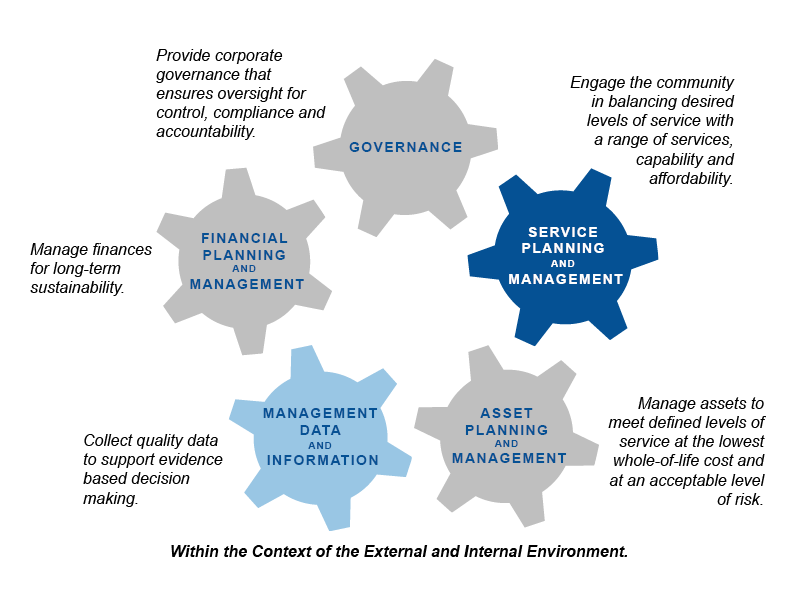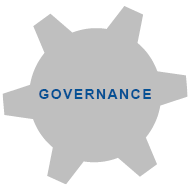Financial sustainability of Queensland local governments is becoming increasingly important and challenging. The long lifecycle of most council assets means that turning around council finances can take significant time to see the benefits, while poor decisions take time to manifest. However, prudent financial management over the term of a council will have long-term benefits to the community.
In March 2020, Queensland local governments will have elections for the next four-year term of council. It is important that the community elect councillors based on a realistic understanding of what is achievable in the next term and the financial sustainability challenges that will need to be addressed.
The purpose of the Financial Sustainability Health Review is to undertake an independent and objective assessment of council’s financial health and outline the likely impact of different financial strategies over the next term.
Council can use the outcomes of this report to inform the electoral process, and/or brief the incoming council. The use of this report is at the discretion of the client.
Introduction
Financial sustainability is a significant concern for many Queensland councils. The Queensland Audit Office concluded in 2016/17 that most councils plan poorly for the long term and that their long-term financial forecasts and asset management plans lack substance. Furthermore, QAO concluded most councils lack rigour and are not well placed to understand the important relationship between future net operating revenues, asset spend and debt and how these affect their sustainability.
CT Management Group has over 25 years’ experience supporting Queensland local governments’ understanding of financial sustainability challenges and the actions needed to address them. Our expertise includes developing long-term financial plans, strategic asset management plans, utility (water, sewerage and waste) charges, governance frameworks, information management and project investment decision frameworks.
Our financial management team includes:

David Spearritt – a Certified Practicing Accountant (CPA) who will apply his expertise obtained over 40 years as a Local Government Chief Finance Officer, Deputy Local Government Commissioner, Director Treasury and a successful consultant and expert advisor to local governments and agencies.

Natalie Kent – an accomplished executive leader who is well respected within local government. Natalie’s experience includes 10 years as Manager Performance Solutions and Manager Finance, Governance and Community for LGAQ. Natalie was recently awarded a Life Member of the Local Government Financial Professionals for her dedication and service to local government for over 40 years.

Graham Jarvis – a Certified Practicing Accountant (CPA) with over 25 years’ experience in State Government and Local Government, including executive roles such as Director Corporate Services, Director Business Services, Executive Manager Project and Asset Management and Finance Manager.
Sustainable Council Framework
CT Management Group has developed an integrated approach to financial sustainability – The Sustainable Council Framework.

The Council Financial Sustainability Health Review has been developed based upon the Framework outlined above. The Health Review includes independent assessment, observations and recommendation on the following:

- Review and assess whether the current governance framework meets the regulatory requirements and compare to best practice for sustainable management. A key consideration will be the integration of the service planning with asset and financial planning and strategies, including key sustainability indicators. Then provide recommendations to improve the planning framework.
- Independent assessment of the Planning, Financial Management and Accountability – Statutory requirements checklist and calendar.

- Assess the current Long Term Financial Plan (or Long Term Financial Forecast) and provide an alternative LTFP to address any areas requiring improvement. This includes an assessment of previous financial statements and current policy settings (e.g. Revenue Policy, Capital Works Plan, Adopted Strategies, Service Plans etc.). This includes benchmarking and comparison of indicators with comparable councils (financial and sustainability indicators).
- Revise the current rating policy against local government rating principles (i.e. equity, capacity to pay) and provide commentary on areas that may improve the yield from rating.
- Provide a summary assessment of utility charges against the principle of full cost pricing and provide recommendations to improve the yield from utility charges.

- Facilitate a self-assessment against the Service Planning Assessment Framework.
- Assess the understanding of the range and levels of service.
- Assess the understanding of the revenue and cost of services.
- Assess the understanding of the value the community obtains from the services.
- Assess the current practices for monitoring and reporting on the delivery and performance of services.
- Benchmarking and comparison of asset management indicators with comparable councils.

- Facilitated self-assessment against the National Asset Management Assessment Framework (consistent with ISO55000 series).
- Assess the strategic asset management capability.
- Assess capability for managing and maintaining key infrastructure assets.
- Assess the risk management approach to assets.
- Assess the integrated and planned approach to lifecycle management of assets.

- Assess the availability and access to essential information to inform investment (e.g. project) decisions and establishing financial policies.
- Assess the asset management information systems, including asset register and valuations.
- Assess the approach to the prioritisation and selection of projects, including development of the capital works plan.
- Assess the use of data and information to monitor and control asset and service performance.
Financial Sustainability Project Report
A Project Report will address key themes as follows:
- Sustainable leadership, including development of sustainable policies and strategies and decision making.
- Evaluation of the adequacy of council’s processes for developing the long-term financial plan/forecast (high level review and assurance or otherwise of the adequacy of the process and outcome).
- Consideration of council’s key performance indicators, including comparison against comparable councils and identification of areas where council may be able to be improve where appropriate.
- Council status regarding:
- Management of sustainable range and levels of services;
- Sustainable long-term asset management (including identification and funding of whole-of-life costs);
- Internal and external audit issues; and
- Rating and revenue capacity and practices.
For further information on the outputs and reports generated by the CT Management Group Financial Sustainability Health Review or for a proposal, please contact 1300 500 932 or complete the form below.
Alternatively, if you have any questions please contact Graham Jarvis, Regional Manager (QLD) grahamj@ctman.com.au mobile 0408 166 636.